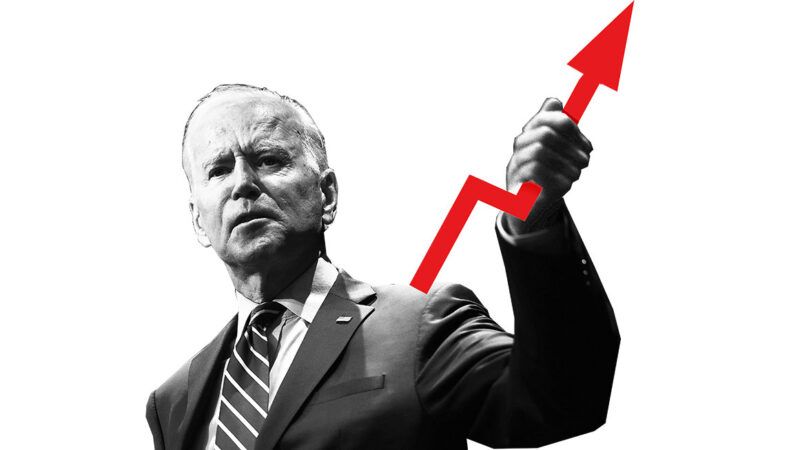Biden Ignores His Own Role in Inflation
Stimulus checks, government spending, and Putin’s invasion of Ukraine are only part of the problem.

Hours after the federal government released data showing that inflation hit a 40-year high in March 2022, President Joe Biden said Russian President Vladimir Putin was responsible for "70 percent of the increase in prices."
Biden was partly right: Russia's invasion of Ukraine, which caused much of the world to reduce or stop purchases of Russian oil, contributed to a spike in gasoline prices, which in turn was a major factor in overall inflation in March. But the current bout of inflation—which hit 8.5 percent in March, the worst devaluation of the dollar since the early 1980s—predates Russia's invasion, and the underlying causes go beyond higher gas prices. If Biden is looking to spread the blame evenly, he should look in the mirror.
The textbook explanation for inflation is that it results from more money chasing the same amount of goods. And there is a lot more money in the economy right now than there was before the COVID-19 pandemic, thanks to $800 billion in stimulus payments distributed to nearly all American households. Prior to the March 2021 passage of the $1.9 trillion American Rescue Plan, which included the largest set of stimulus payments, even liberal economists like Lawrence H. Summers, a veteran of the Clinton and Obama administrations, were publicly sounding the alarm about coming inflation.
Such broad-based welfare "may have contributed to an increase in inflation of about 3 percentage points" by late 2021, according to a recent report from economists at the San Francisco Federal Reserve. They said the infusion could explain why inflation was running higher in the U.S. than in most other countries.
Biden is now poised to dig a deeper hole. In a notice published on March 18, the Department of Labor said it would begin the process of changing how "prevailing wages" are determined for contractors on infrastructure projects. The change, which seeks to undo a Reagan-era policy aimed at combating inflation in the early 1980s, would affect an estimated 94,000 contractors, who are likely to see average pay increases of $3.65 per hour.
Dan Bosch, director of regulatory policy for the American Action Forum, a center-right think tank, thinks changes to the prevailing-wage rules are "ill-timed." The resulting increase in labor costs, he says, "will contribute to higher inflation and reduce the number of infrastructure projects that can be pursued."
It wouldn't be the first time the Biden administration has ignored such warnings. But the president's labor union allies no doubt will welcome the prospect of higher pay for the same work.


Show Comments (119)